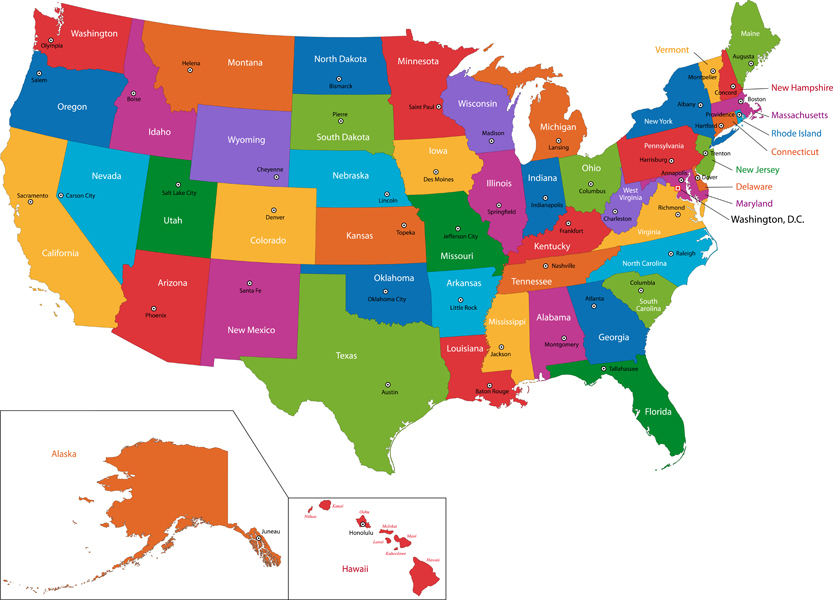Many charities are surprised when they first learn that charitable solicitation is regulated. Must charities register as to solicit funds in every state with a registration requirement because their websites are available to users in every state? The Pennsylvania Attorney General thinks so.
One IRS official has even queried whether noncompliance with state registration requirements could adversely affect an organization’s tax-exempt status due to a violation of public policy. Echoing this sentiment, the revised Form 990 now asks filers to:
“List all states in which the organization is registered or licensed to solicit funds or has been notified it is exempt from registration or licensing.”
Inconsistent Registration Requirements
Forty-one U.S. states, as well as the District of Columbia and many local jurisdictions, require some type of registration for charities trying to solicit funds. These laws create a patchwork of largely inconsistent laws that nonprofits must contend with.
To add to the confusion, the jurisdictions that require charitable solicitation registration have different definitions and standards regarding who must register, which documents are required, whether nonprofits must renew their registrations, and which government agencies process the registrations.
Typically, state charitable solicitation statutes regulate the following:
- Charitable Organizations that solicit
- Professional Fundraisers that plan fundraising campaigns
- Professional Solicitors that solicit on behalf of charities
- Charitable Sales Promotions where a company offers to donate a portion of sales proceeds to charity
Many states define solicitation extremely broadly. The charitable solicitation does not have to be successful. The mere request often triggers a duty to register.
Unified Registration Statement
The National Association of State Charities Officials and the National Association of Attorneys General created a form Unified Registration Statement in an attempt to standardize the registration methods across the country. Over 36 jurisdictions accept the Unified Registration form; however, they often differ in their specific requirements. More recently, numerous states have moved their registration process online.
Charleston Principles
In an attempt to offer some clarity to the murky legal landscape facing charities and state regulators, the National Association of State Charity Officials (NASCO) released non-binding guidelines, known as The Charleston Principles. The Charleston Principles attempted to provide guidance to both charities and state regulators regarding the application of state registration requirements to charities soliciting donations over the Internet.
In general, the Charleston Principles attempt to define the type and extent of activity that will trigger the duty to comply with a state’s registration requirements. The following summarizes the key points:
Activities that do trigger a duty to register
- A charity is domiciled in the state and passively or actively solicits contributions over the internet.
- A charity is domiciled in the state and its principal place of business is located in that state.
- A charity is not domiciled in the state, but its non-internet activity in that state would require registration under existing law.
- A charity solicits donations through an interactive website; the charity either:
- specifically targets persons located in the subject state for solicitation; or
- receives contributions from the state on a repeated and ongoing basis or a substantial basis through its website.
5. charity solicits donations through a non-interactive website, and the charity either:
- invites further offline activity to complete a contribution; or
- establishes other contacts with the subject state (i.e., by sending e-mail messages or other communications that promote cauthe site).
Activities that do not trigger a duty to register
A charity, operating on a purely local basis or within a limited geographic area, does not target states outside its operating area if the charity’s website makes clear that its fundraising focus is limited to that area even if it receives contributions from outside that area on less than a repeated and ongoing basis or a substantial basis.
Unfortunately, in recent years more and more regulators have chosen not to follow the Charleston Principles and have interpreted a mere passive “donate here” button to trigger the duty to register in their state.
Related read: Arkansas Charitable Soliciation Law
Practical Approach to Protect Charities that Operate in Different States
In light of the complexity and expense of registering in every jurisdiction, what should charities who take donations over the Internet do to protect themselves? Some practical suggestions include:
Related read: Federal Court Rejects Change to Substantial Contributor Reporting Requirement
- Follow the rules of each state for registration, reporting, documentation, etc.
- Register in your home state and states where you target donors.
- Register before you start fundraising.
- Determine the number of contributions from states other than those in which you are currently registered. If contributions from other states exceed cost of registration, register there.
- Place a disclaimer on your website that donors must be located within certain state(s).
Ellis Carter is a nonprofit lawyer with Caritas Law Group, P.C. licensed to practice in Washington and Arizona. Ellis advises nonprofit and socially responsible businesses on corporate, tax, and fundraising regulations nationwide. Ellis also advises donors with regard to major gifts. To schedule a consultation with Ellis, call 602-456-0071 or email us through our contact form.

